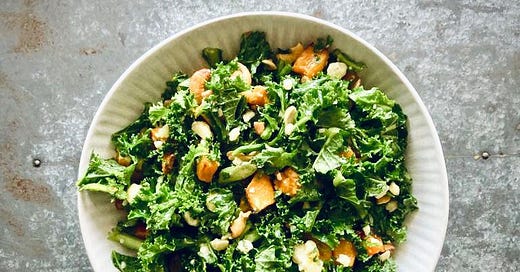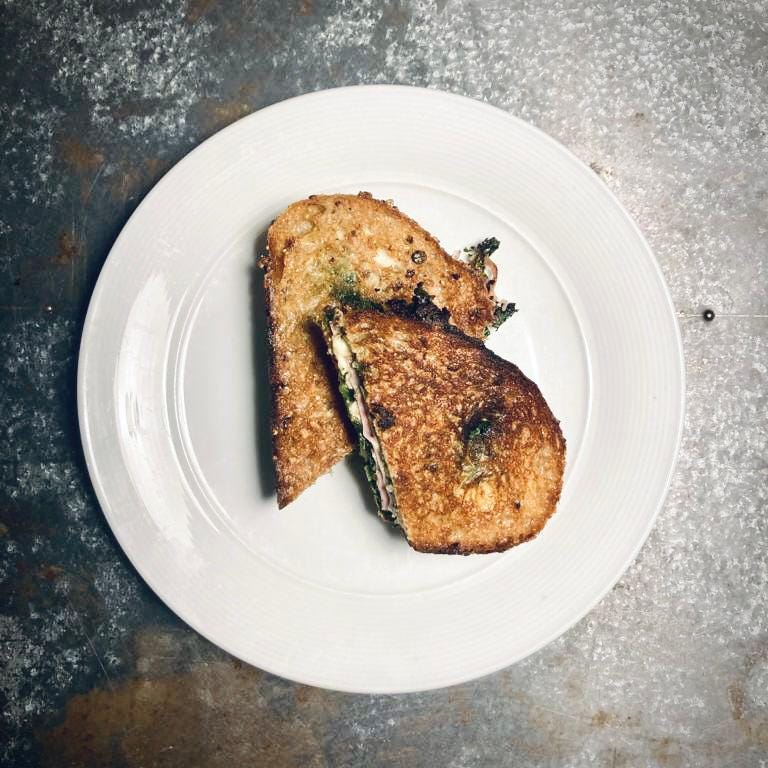All Hail the Kale & Roast Chicken, 90's Style: Genius Recipes by Kristen Miglore + The Naked Chef by Jamie Oliver
#FiftyTwoCookbooks | Weeks Fourteen and Fifteen
There are some books that are so accurately named that it is quite staggering, and Genius Recipes really is one of those, proving itself deserving of its title time and time again. I have cooked more recipes from it than perhaps any other book on my shelf, and there are several that I return to over and over (hello Marie-Hélène’s Apple Cake, which is my go-to dessert whenever I’m tasked with making a pudding).
For a couple of reasons I was flying solo this week, holding the fort and looking after the whippet during the long weekend which meant cooking for one for a total of six nights - only two of which saw me at work.
Often when I find myself captaining the ship alone there is a tendency for me to embrace a degree of ferality and indulge in food that arrives on the back of a moped – but longer periods of time require some degree of self-care in order to maintain at least a veneer of responsibility.
A few years ago, kale became shorthand for a diet regimen that was overly wholesome, a by-word for health and wellness one-upmanship. Previously seen as fit only for animal fodder, kale’s renaissance saw it end up in everything from salads to smoothies.
The inevitable backlash failed to dull my enthusiasm for the vegetable: not through any desire to achieve peak vitality, but because I happen to find kale both delicious and versatile. It’s great stirred through mashed potato, kale caesar is both a pleasing pun and a tasty salad and, when battered and deep fried, it makes for a superlative base layer in a kale chaat (thank you The Tiffin Truck for the introduction).
I bought a couple of bunches of kale knowing full well that it meant I could cook two different recipes from the book and, at the same time, convince myself that I was at least on nodding terms with an attempt to eat wholesomely over the long weekend.
A raw kale salad might be seen as a chore for those with lazy mandibles but I quite like a salad that fights back, especially one with a dressing made primarily of cheese. Roasted diced squash and toasted almonds prove the maxim that all a salad needs in order to provide deep levels of satisfaction is a cacophony of contrasts, both textural and on the pH scale, with fresh lemon juice providing a pleasing counterpoint to the fats – in this instance olive oil and a crumbly, well-aged cheddar.
Cheese and kale proved to be happy bedfellows again in the distinctly more carby kale panini. I probably eat more than a sensible number of toasties (or what is amusingly referred to in the States as ‘grilled cheese sandwiches’). There is almost always bread in the house. There is almost always cheese in the fridge. There is always an adventurous array of pickles, chutneys, sauces and condiments with which to adorn what is - let’s not beat about the bush - essentially a fried butty.
Getting in late after service, suddenly ravenous and needing something that requires little effort and time means that the frying pan comes out around 11pm at least once a week and quickly afterwards I nestle into bed with a belly full of dream-inducing happiness. All that needs to be said is that blanched kale is an excellent addition to a toasted cheese sandwich, and will likely be making its way onto the roster with immediate effect.
The Naked Chef by Jamie Oliver
I read Henry Mance’s excellent FT piece on masculinity in the same week as cooking from Oliver’s debut book, The Naked Chef, and both transported me rapidly and unremittingly back to the late 1990’s, which disturbingly, increasingly, really does seem to be a foreign country. Both Mance and I are ‘geriatric millennials’ (sigh) and in his examination of what it means to be young, male and online in 2023, Mance references his own touchpoints from a similar point in his life: a pre-Internet era when magazines aimed squarely at teenage boys and young men (‘lads’, in 90’s parlance) dominated the shelves of the local newsagent, offering young males a very specific brand of advice on how to be a man. Just as lad mags slid into obscurity and ‘the arc of history seemed to be bending towards a masculinity that didn’t objectify women, and that didn’t see men and women as so separate,’ (Mance, 2023) along came the likes of Andrew Tate and the global behemoth that is YouTube, with its pervasive algorithms and always available presence. I won’t be able to do full justice to Mance’s writing, nor is it possible (or sensible) to summarise his conclusions here, but I strongly advise you to give his article the attention it deserves.
Slightly less problematic but equally as evocative of the era of my late teenage years is Oliver’s debut, The Naked Chef. Reading this cookbook now, close to the 25th anniversary of its publication, I noticed a gentle chaos to its recipes that I didn’t recall from the days when I used to refer to it on a near-weekly basis while first learning to cook. It’s just so very - well - nineties, I suppose, is the best adjective to use.
There is little in the way of structure or theme and there is a truly global array of influences – but it is endearing, deeply so. Oliver’s boyish enthusiasm is clearly evident and there is little hint of the global megastar he would become. Plus there are some real gems tucked amidst the pages, as well as a few opportunities for nostalgia – for a time when the world seemed like a simpler place, and the answer to most culinary questions appears to have been ‘just add herbs’.
This week I chose to revisit Jamie’s roast chicken recipe: I’d cooked it just once before, about two decades ago, and though it’s a simple enough dish and I’ve roasted more than a few chickens since then, the memory of this particular culinary endeavour has stuck with me. Back then I also had a boyish enthusiasm for cookery and a desire to spread my wings as wide as possible: I made a roast dinner for my then girlfriend and her family, picking up the ingredients en route to her house and spending hours in her parents’ kitchen bringing everything together, with a level of pride perhaps at odds with the degree of success - though they were all very polite, and assured me they’d enjoyed the meal.
Upon returning home the following morning I was sat down and gently told that my Swedish grandmother, my mother’s mother or mormor, had passed away the day before. She didn’t speak any English and I spoke very little Swedish, so language was always a barrier between us – but she was always so pristine, immaculately dressed at all times, even despite the constant pain of arthritis which forced her into a wheelchair for her final years. When I was tiny and visiting Sweden with my mother for holidays, my mormor used to make me breakfast: she would present me with a plate of distinctive wafer biscuits spread with pure white Swedish butter and honey – and her house always smelled of coffee, and cinnamon. I was only reminded of the connection between this particular dish and the memory of my grandmother when flicking through the book, and was struck by a rush of recollection, and sadness: I wish I’d got to cook for her.
With twenty years of experience now separating the two meals, I admit I raised an eyebrow at Jamie’s method which seemed so brash, so carefree, so (again) nineties: just season with salt and pepper, slash the legs and thighs, rub a few chopped herbs under the chicken’s skin, wedge some hardy herbs and half a lemon inside it and then roast for one hour at 225 degrees centigrade. No messing around with brining, low-and-slow cooking or separating the crown from the rest of the bird to ensure a perfect-doneness throughout (all methods I’ve tried since) – just throw plenty of herbs at it and whack it in a scorchingly hot oven for 60 minutes, potatoes and carrots scattered suitably haphazardly around the chicken.
My scepticism was short-lived and I had to lower my eyebrow: this turned out to be a truly excellent chicken, a roast that reminded me of simpler times, and I will definitely be using Jamie’s method again in the future. Unlike bootcut jeans, oversize shirts and rapidly-rising interest rates, some aspects of the 90’s are extremely welcome to return.
In other news: next Tuesday 2nd May we open reservations at Vanderlyle for tables in June: sign up to our newsletter for a reminder in the morning or loiter on Tock around midday to book in for a feast that may or may not include kale in some form or another.
Next week’s cookbooks are Towpath: Recipes & Stores by Lori De Mori & Laura Jackson, and Simple by Diana Henry. And then I’ll have (finally) caught up with myself. Thanks for sticking around while I wrestle this project back on track.







Yay! I was wondering when the next instalment would appear. I do look forward to these cookbook adventures. X
Glorious writing… bootcut a hard no, but Oliver’s ouvre may survive better looking back than several of his more lauded and cheffy contemporaries